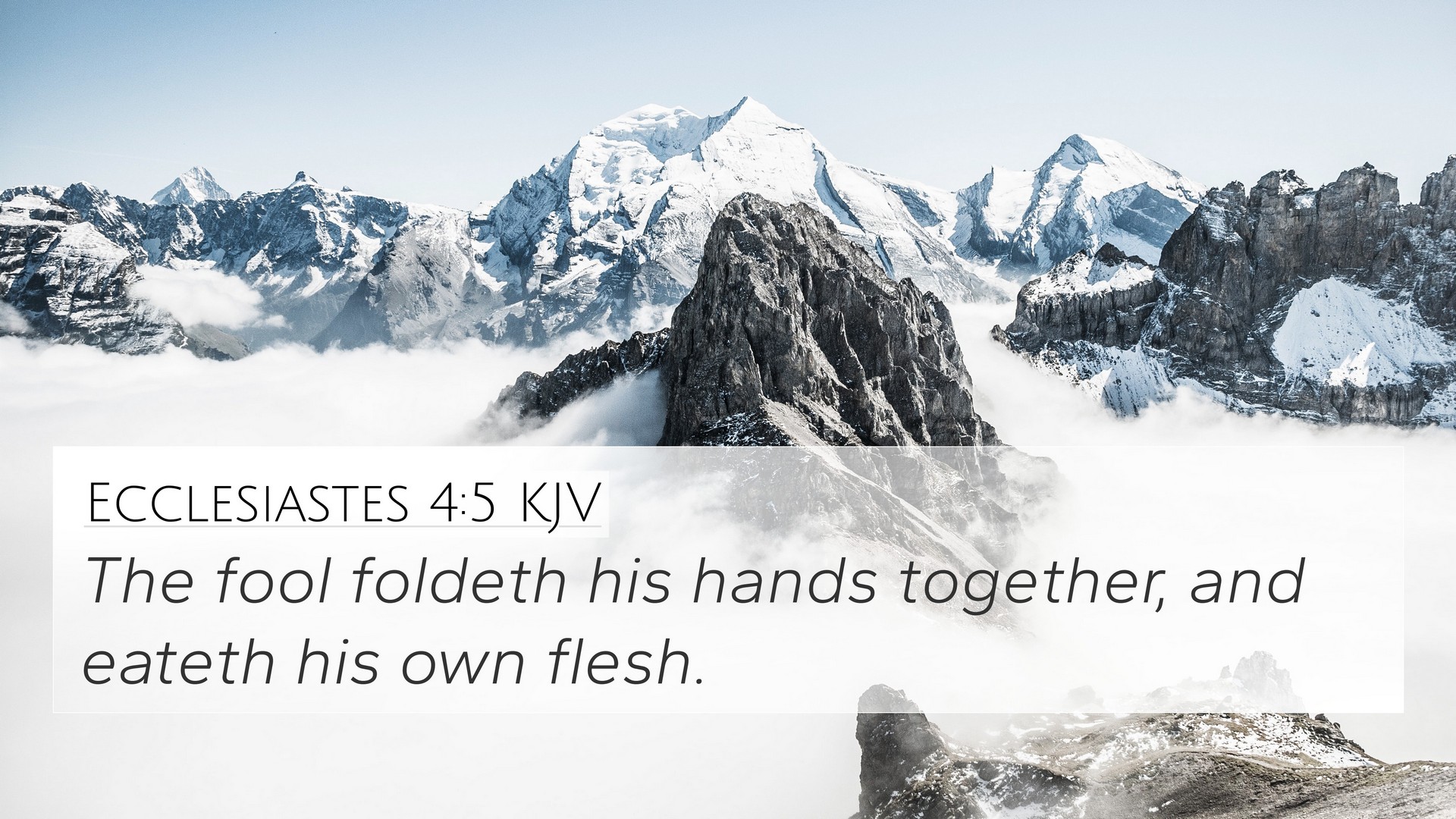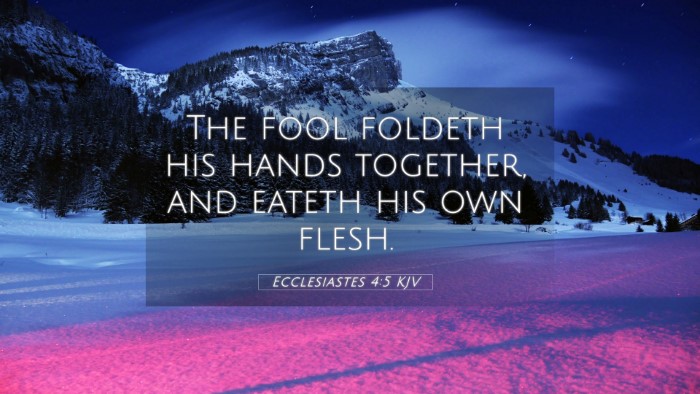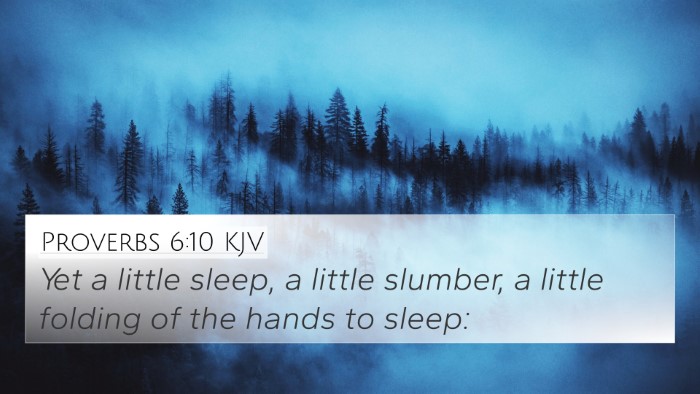Old Testament
Genesis Exodus Leviticus Numbers Deuteronomy Joshua Judges Ruth 1 Samuel 2 Samuel 1 Kings 2 Kings 1 Chronicles 2 Chronicles Ezra Nehemiah Esther Job Psalms Proverbs Ecclesiastes Song of Solomon Isaiah Jeremiah Lamentations Ezekiel Daniel Hosea Joel Amos Obadiah Jonah Micah Nahum Habakkuk Zephaniah Haggai Zechariah MalachiEcclesiastes 4:5 Similar Verses
Ecclesiastes 4:5 Cross References
The fool foldeth his hands together, and eateth his own flesh.
Uncover the Rich Themes and Topics of This Bible Verse
Listed below are the Bible themes associated with Ecclesiastes 4:5. We invite you to explore each theme to gain deeper insights into the Scriptures.
Ecclesiastes 4:5 Cross Reference Verses
This section features a detailed cross-reference designed to enrich your understanding of the Scriptures. Below, you will find carefully selected verses that echo the themes and teachings related to Ecclesiastes 4:5 KJV. Click on any image to explore detailed analyses of related Bible verses and uncover deeper theological insights.
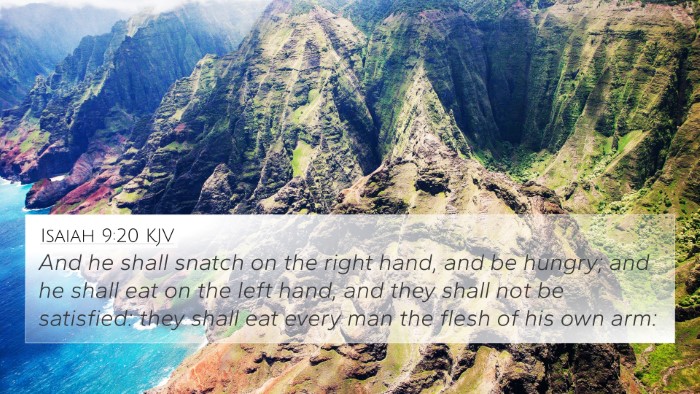
Isaiah 9:20 (KJV) »
And he shall snatch on the right hand, and be hungry; and he shall eat on the left hand, and they shall not be satisfied: they shall eat every man the flesh of his own arm:

Proverbs 12:27 (KJV) »
The slothful man roasteth not that which he took in hunting: but the substance of a diligent man is precious.
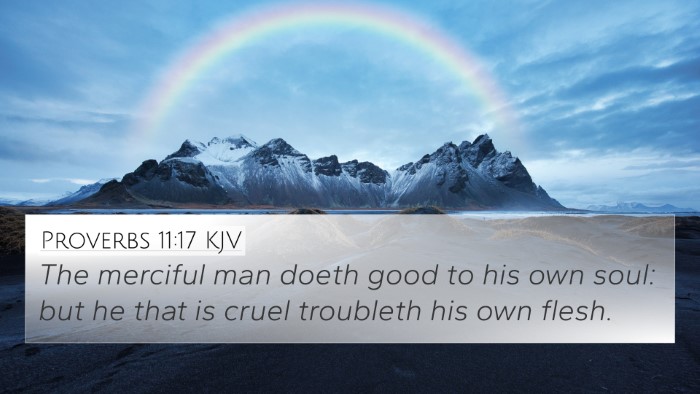
Proverbs 11:17 (KJV) »
The merciful man doeth good to his own soul: but he that is cruel troubleth his own flesh.

Proverbs 24:33 (KJV) »
Yet a little sleep, a little slumber, a little folding of the hands to sleep:

Proverbs 13:4 (KJV) »
The soul of the sluggard desireth, and hath nothing: but the soul of the diligent shall be made fat.
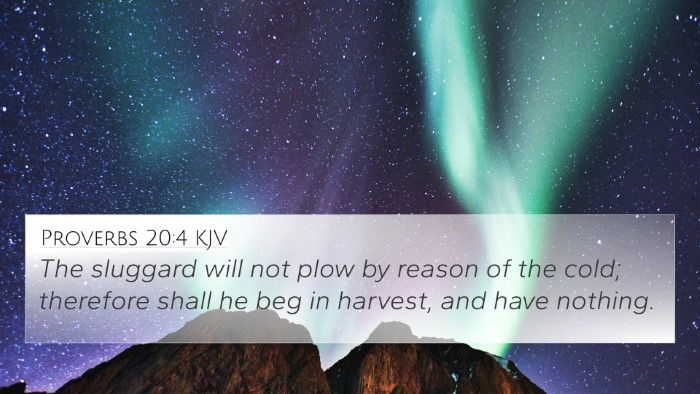
Proverbs 20:4 (KJV) »
The sluggard will not plow by reason of the cold; therefore shall he beg in harvest, and have nothing.
Ecclesiastes 4:5 Verse Analysis and Similar Verses
Understanding Ecclesiastes 4:5
Ecclesiastes 4:5 states: "The fool foldeth his hands together, and eateth his own flesh."
Summary of Meaning
This verse suggests a profound truth about idleness and laziness. It starkly illustrates that a fool, in choosing inactivity and sloth, ultimately harms himself. The imagery of eating one’s own flesh emphasizes the self-destructive nature of such behavior. This theme is echoed throughout scripture, connecting with a broader biblical discourse on work, diligence, and the consequences of irresponsibility.
Insights from Public Domain Commentaries
Matthew Henry
According to Matthew Henry, this verse encapsulates the folly of laziness. He draws attention to the foolishness of neglecting to work, arguing that in doing so, one is complicit in their own demise. Henry emphasizes the duality of folly versus wisdom, urging readers to comprehend the grave implications of idleness.
Albert Barnes
Albert Barnes elaborates on the metaphor of "eating his own flesh," interpreting it as a representation of self-destruction. Barnes highlights how the fool's inaction results not only in his own poverty but signifies a deeper spiritual deadness. He points to the critical need for diligence as a biblical principle that is pivotal to divine blessing and human prosperity.
Adam Clarke
Adam Clarke’s commentary reveals additional layers to this verse, indicating that idleness leads to misfortune. Clarke argues that unwillingness to engage in productive work harms not just the individual but may spread misfortune across relationships and communities. He reminds readers of the Biblical emphasis on labor and the importance of fulfilling one's responsibilities.
Bible Cross References
- Proverbs 6:6-11: The Ant and the Sluggard - A call to observe and learn the value of hard work.
- Proverbs 10:4: "He becomes poor that deals with a slack hand: but the hand of the diligent makes rich."
- Proverbs 12:24: "The hand of the diligent shall bear rule: but the slothful shall be under tribute."
- Proverbs 18:9: "He also that is slothful in his work is brother to him that is a great waster."
- 2 Thessalonians 3:10: "For even when we were with you, this we commanded you, that if any would not work, neither should he eat."
- Ecclesiastes 10:18: "By much slothfulness the building decayeth; and through idleness of the hands the house droppeth through."
- 1 Timothy 5:8: "But if any provide not for his own, and specially for those of his own house, he hath denied the faith, and is worse than an infidel."
Thematic Bible Verse Connections
The themes of laziness and self-destruction in Ecclesiastes 4:5 resonate throughout various books in the Bible. These connections form a comprehensive framework for understanding the scripture's perspective on work ethics and diligence. They serve as a reminder to reflect on the intentions behind our actions and the necessity of actively participating in life's responsibilities.
Conclusion
In summary, Ecclesiastes 4:5 personifies the perils of idleness through vivid imagery that warns against the consequences of inaction. The insights from several commentators reinforce the necessity of diligence and responsibility while highlighting broader biblical truths about work and its significance in the life of a believer.
